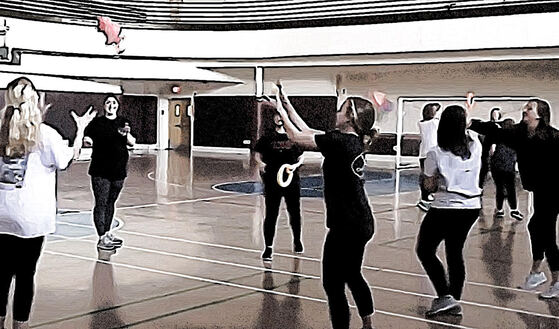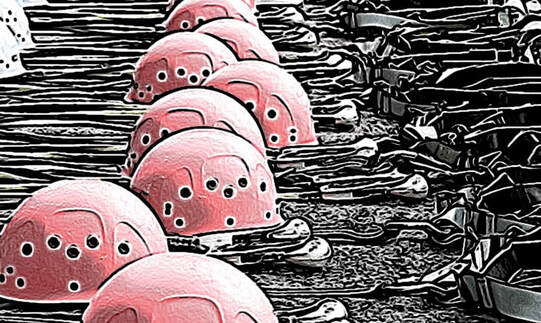|
This is a conversation (video recorded with ZOOM) on Ground Rules and Group Contracts (e.g., Full Value Contract) between John Losey and me (Chris Cavert) recorded on Sept. 19th, 2019 (about 54 minutes). I wanted to get this into the OTB resources so it's easily searchable and accessible.
Below you can read some of the thoughts from the conversation. We would love to hear your thoughts on the topic. Please leave us a Comment.
What are ground rules or contracts? These are agreements on, "how we are going to BE together." In other words, what are the "rules" we're going to follow when we're together?
Many people (e.g., Corporate Adults) come into programs with expectations. Ground Rules and Contracts help us "align" expectations around how they treat each other and how they want to be treated so there is less misunderstanding. "What makes it fun for you when you're with a group of people?" This might be a way to approach rules or contract development. (Start from what your group may understand - fun, we hope, is understandable to most people.) Working with adults, John shares, "I want to have them take control over how they want to treat each other..." "If this is going to be the 'perfect' meeting, what's going to happen. What do you [the individuals] need from it, what does the group need from it?" (John leads with this idea through, "Setting goals and ground rules.") "What do we need from each other to best reach these goals?" With adult learners (research says), if the facilitator (leader) takes too much control, it limits the buy-in from participants. (How does this play out based on the time you have with a group?) When people feel like they've been heard, they're more likely to respond and interact in positive ways. Including 'people' in rules/contract development, whether group led or facilitator led, increases the likelihood of positive interactions. (A line of thinking: If this, then that...) You [the educator/facilitator as a 'role'] shouldn't totally eliminate yourself from the process, but it's good to be aware of your positional power, even your authoritarian or experiential power...and not abuse that and steal from the groups learning. Ground rules and contracts are not just about team building and group process, they are functional tools to get you where you want to go more effectively and efficiently.
We would love to hear your thoughts about Ground Rules and Contracts. Leave us a Comment.
Be well!! Chris & John
Would you like a (super) quick email notification when new OTB content (blog post or podcast episode) is available? Fill out the form below and we'll let you know.
0 Comments
The following was part of a recent email I received:
When you are writing up your activities [for the FUNdoing.com/blog], I would find it really helpful to have an added header that includes the activity's goals and/or objectives at the top of the description. Even though I was familiar with a number of the activities you described in the recent [FUNdoing] Friday emails [June 12th, the Group Juggle Variations & June 24th, the Mr. & Mrs. Wright Collection], I re-read the descriptions several times because the activities had twists and therefore I wasn't sure whether the typical goals/objectives had shifted. In gratitude, Pamela
This email inspired me to share my perspective about, what Pamela phrases, "the activity's goals and/or objectives..." (Thanks Pamela for the request and inspiration.)
The short version: It is very common for goals and objectives to be considered synonymous - this can happen when a goal is woven into an objective (totally fine when done with purpose, in my opinion). For clarity, I separate the two when training educators (e.g., team builders). In most cases, objectives originate from the educator (i.e., team builder, programmer, teacher, curriculum developer). Goals are created by participants - especially, during teambuilding programs for practicing the behaviors related to goal setting. If you are happy with, and already feel comfortable with these distinctions, you might not need to dive into the long version below. I have found (over the past 20 years), that clearing up grey areas for learners (e.g., synonymous terms), practice seems to be clearer. (How about this one: What's the distinction between processing, debriefing, reviewing, reflection? How do you explain this to new learners?)
Here's a long version - the way I teach the concepts of objectives and goals. My 'goal' here is to share my thinking in under 500 words in order for you to get the idea (expanding on the idea can be for another day).
Objectives In the context of teambuilding programs, there are two kinds of objectives:
Activity Objectives Literally, what is expected based on the activity description. For example: Hand off what's in your hand to the person on your right or left based on the language in the story. (Activity: Mr. & Mrs. Wright). Isn't this a goal Chris? Good question. After reading the 'Goals' section below you will see the distinction. Another quick example. Toss this object around the group as quickly as possible following these rules..... (Activity: Basic Group Juggle - video of the basics) Everyone participating in the activity is made aware of the objective through the directions (well, they are told, but awareness might be limited). Facilitated Objectives I describe these as possible learnings. When a client asks me to 'work on' certain concepts with a group or help them learn something (e.g., communication, trust, leadership, problem-solving, relationship-building, helping, having fun), I consider and program activities that, I believe, will help the group practice the concepts. (My considerations are based on my experiences with the activities I know.) My plan is to 'facilitate' towards the clients desired objectives - facilitated objectives. Participants in the program may or may not be fully aware of all the facilitated objectives I have planned. This depends on the context of the group. For example, based on program/learning objectives, it might be an advantage to share facilitated objectives with an adult group, but with a youth group it might not be necessary. Goals Goal-setting is the common term for an expectation one wants to meet (personally or as a group). We don't hear (or use) the term objective-setting. So, I like to purposefully separate the concept of goals from objectives. As noted in the context of team building, an objective is presented by the educator, goals are developed and pursued by the participant(s). In the most straight-forward way I can share this, there are two types of goals we tend to use during teambuilding. Product-oriented goals and process-oriented goals. A product-oriented goal is, most often, a result of work completed - often a number or time. A process-oriented goal is usually something someone or the group agrees to do during the work that leads to completing a task. In theMr. & Mrs. Write activity, a product-oriented goal might be for participant to have only one object in his/her hand at the end of the story. A process-oriented goal might be for everyone to have permission to call, "Stop" if there is a problem during the activity or if someone needs some help on their way to meeting the product-oriented goal. In the Basic Group Juggle activity, a product-oriented goal can be a certain time to achieve. The process-oriented goal might be to call out names before tossing an object in order to increase the level of catching success. In the midst of problem-solving towards the objective, the group develops goals to strive for - hence, practicing goal-setting behaviors in order to meet objectives.
Professional Development Opportunity
If you're up for a little professional development challenge, dive into the Mr. & Mrs. Wright Collection & Group Juggle Variations FUNdoing Blog posts and write up the Activity Objectives, Facilitated Objectives and a Goal for each one of the activities. If you would like, send them to me and I'll provide you with some feedback. I hope you found these distinctions useful. We'd love to hear your thinking on the subject. Leave us a Comment below. All the best, Chris Cavert, Ed.D.
Would you like a (super) quick email notification when new OTB content (blog post or podcast episode) is available? Fill out the form below and we'll let you know.
(This is a migration and updated post - it was first shared at the FUNdoing.com Blog. We are moving theoretical posts to OnTeamBuidling in an effort to organize content.)
An Alfie Kohn* blog post, Transformation by Degrees inspired me, a while back, to put together a few thoughts I'd been having about 'participant-centered' team building. Now, as team builders and experiential educators, most of us know how important it is to build a trusting community of learners by first getting to know our learners (as the teacher discovered in Mr. Kohn's first story). After we get started, how do we, as team builders, shift more (or all?) "control" of our learners' experience to them?
*Alfie Kohn is an educational thought leader advocating for less homework, less testing, and more "student-centered" educational practice. He is one of my heroes.
At this time, I have more questions than answers about how to make team building more "participant-centered." In this post my intention is to light the fire. Let's see what we can come up with together. To get the wheels turning, let me share a couple of recent stories and then share some thoughts from Kohn's post, Transformation by Degrees.
A recent change to my facilitation process has been to let go of the traditional "harness & helmet demo" and have my groups figure out how to get their PPE on appropriately. As a whole, the group is in charge of getting this task done correctly, meeting safety standards for proper harness and helmet fit. Now, I do give them some safety standards information: The waist belt must be above the waist. There should not be any twists in the webbing of the harness. And, the helmet must not expose the forehead or fall down over the eyes when climbing. (I am also wearing my PPE appropriately - meeting safety standards - as an example.) This participant-centered approach has become a nice addition to a group's "team" building experience. In most cases so far, it also helps when there is at least one person in the group that has climbed before (having worn a harness). My groups have ranged from 5th graders to adults. Yes, there does need to be fixes from time-to-time (that I point out), but the group is in charge. (NOTE: No one climbs without my approval/visual check - so, if I would say, "You're not ready yet," the participants helped each other reach passing criteria.) On another note, here is a recent story from a fellow facilitator that highlights a factor of "control" (or management) of time with a group. Working with a new group of 12 participants (for a half-day program), my friend wanted to go around the room for (what she requested) "quick" introductions. The first few people shared their name, their role at the company and a little bit about themselves (one-minute tops for each) - all was going as planned. Then, the trend changed. The stories from each participant got longer. The planned (on paper) 10-minute introduction activity turned into over 25 minutes of sharing. So, how do we adjust "control" and still get in everything we've planned? (The thinking: "If we let them be in charge, how will we get things done?") Do we impose a time limit on things so we can get to other tasks on the list? Are our programs about quantity or quality? Can there be both? How much planning with participants can take place before a program? Do we (and they) have time to do this? Again, more questions than answers right now, for me.
Here are some thoughts from Mr. Kohn (from Transformation by Degrees) about moving/ sharing control:
"...those of us who are trying to serve as change agents in education had better not count on teachers’ [team builders] waking up one morning prepared to adopt radically different practices. In fact, we would do well to have some examples ready for how they can get from here to there step by step." [Training team builders to be more participant-centered will take some time and role modeling.] "It is possible to edge slowly away from traditionalism with respect to just about any specific practice." [Try one participant-centered strategy at a time and maybe for just part of the program.] "To learn something about the students [participants] was to transcend (or at least create the conditions for transcending) traditional pedagogy [team builders are pretty good at this part]. To invite the students to talk with, and then introduce, one another was to transcend an ideology of individualism — learning as an activity for a roomful of separate selves. To ask (rather than dictate) what the interview questions should be was to transcend the default model of top-down teacher control. In each case, what was challenged had simply been taken for granted." "At each stage, one can move ahead only after confronting the unsettling truth that what looked like a destination turned out to be just a rest stop. There’s farther to go on this journey." [Find out from the group what else is important to do once you believe you have reached a destination with your group - you might think they are done, but do they think so?] “My job,” a teacher in Ohio once commented, “is to be as democratic as I can stand.” Had she invited me to append a friendly amendment to her declaration, it might have been, “… and my other job is to push myself to be able to stand more democracy next year than I could this year.” "Perhaps our motto should be: Change by degrees - but don't underdo it." Kohn
What are some of the changes you are making (or have made) to be more participant-centered in your programs? What are you doing as a team builder, that could be done by the group? We could put a participant-centered 'in-practice' document together and share it with the world. What do you say? Add your ideas in the Comments below.
Keep us posted! Chris Cavert, Ed.D.
Would you like a (super) quick email notification when new OTB content (blog post or podcast episode) is available? Fill out the form below and we'll let you know.
|
OnTeamBuilding is a forum for like-minded people to share ideas and experiences related to team building. FREE Team Building
Activity Resources OTB FacilitatorDr. Chris Cavert is an educator, author and trainer. His passion is helping team builders learn and grow. Archives
January 2024
|




 RSS Feed
RSS Feed